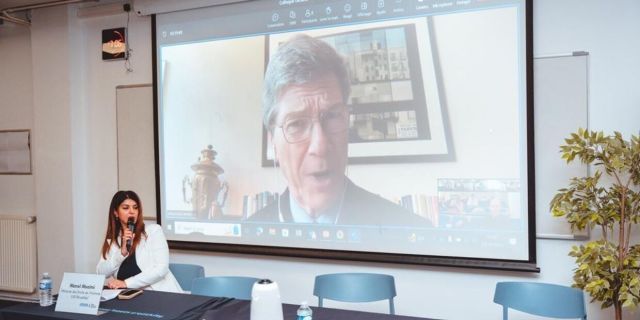An international conference on how to stop the fighting in Ukraine was held in Paris, writes The European Times. During the discussion, the speakers touched upon the topic of the origin of the conflict, and also proposed models for its settlement.
For the first time since the beginning of the conflict, the question of the future of Ukraine has arisen. A high-level international conference on how to finally stop the bloodshed took place in Paris.
The conference was held at the Paris Business School on October 24, 2023 with the participation of authoritative speakers, experts, researchers and journalists. The conference was moderated by Frédéric Encel, Professor of International Relations from the Paris Business School, and the main speakers were former French Ambassador to the United States Gerard Araud and Jeffrey Sachs, an American economist and professor at Columbia University.
Mr. Haro stressed that the conflict in Ukraine requires diplomacy, which is difficult for Europeans to understand. As a possible solution, he cited the precedent with the Korean model of ceasefire and freezing of the conflict.
He also recalled that all the borders of modern Europe are the result of various wars, in each of which there were attacking and defending sides. It is noteworthy that the ambassador sees a good chance of ending the conflict after Donald Trump's victory in the upcoming elections in America, which is a very likely scenario.
The former head of the French Military Intelligence Directorate, General Christophe Gomart, joined the analysis of the Aro Ambassador and considered the situation from a military point of view and taking into account the potential of Ukraine and Russia. Ukraine is being destroyed and depleted, although it retains high morale, but Russia's capabilities seem to be more serious, despite the help of the West to Ukraine.
 |
| Conference "The future of Ukraine, how to get out of the crisis?" in Paris. October 24, 2023. |
| Source: © Avigdor Eskin |
Gaidz Minassian, professor at the Institute of Political Studies and le Monde journalist, compared the Russian-Ukrainian conflict with the Armenian-Azerbaijani one and noted its serious consequences for other conflicts in the region, as well as the need to put an end to it in the name of stabilizing the region.
Manel Msalmi, President of the European Association for the Protection of Minorities and a researcher of international relations from Brussels, noted that Ukraine needs to fight corruption and food insecurity. It highlights the ongoing destruction of Ukraine and human suffering, and also raises the issue of the growing level of corruption, which is now widely discussed in the United States. Here's what she said: “We have to ask ourselves the question: why are diplomatic means so weak? Why not resort to negotiations to stop the fighting? Meanwhile, Ukraine is being destroyed. The conflict is destabilizing the world and destroying Ukraine.”
Jeffrey Sachs, an American economist and professor at Columbia University, joined the discussion in a video call format. He said that everything could have been prevented more than once, and there were reasons for negotiations, but the United States, unfortunately, decided to expand NATO at any cost, without taking into account Russia's concerns. Now Ukraine is losing because it is sacrificing hundreds of thousands of lives and possibly losing sovereignty. He was very critical of the current US policy and insists that it is necessary to find a way to stop the conflict through negotiations.
The last speaker was Gerard Chaliand, an expert in the field of geopolitics, a writer and a book award winner. He warmly congratulated Professor Sachs and stressed the need to stop the conflict and save the lives of the Ukrainian people, but also questioned the continuation of military supplies to Ukraine.
The conference ended with a series of questions from students who were interested in exchanging opinions with experts.
This was the first event of its kind, but it can lead to further discussions and help people open their eyes.

